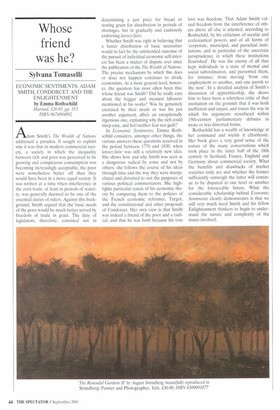Whose friend was he?
Sylvana Tomaselli
ECONOMIC SENTIMENTS: ADAM SMITH, CONDORCET AND THE ENLIGHTENMENT by Emma Rothschild Harvard, £30.95, pp. 353 ISBN 0674004892
Adam Smith's The Wealth of Nations addressed a paradox. It sought to explain why it was that in modern commercial society, a society in which the inequality between rich and poor was perceived to be growing and conspicuous consumption was becoming increasingly acceptable, the poor were nonetheless better off than they would have been in a more equal society. It was written at a time when interference in the corn trade, at least in periods of scarcity, was generally deemed to be one of the essential duties of rulers. Against this background, Smith argued that the basic needs of the poor would he much better served by freedom of trade in grain. The duty of legislators, therefore, consisted not in determining a just price for bread or storing grain for distribution in periods of shortages, but in gradually and cautiously endorsing laissez-faire.
Whether Smith was right in believing that a better distribution of basic necessities would in fact be the unintended outcome of the pursuit of individual economic self-interest has been a matter of dispute ever since the publication of the The Wealth of Nations. The precise mechanism by which this does or does not happen continues to divide economists. At a more general level, however, the question has most often been this: whose friend was Smith? Did he really care about the beggar and meanest labourer mentioned in his works? Was he genuinely exercised by their needs or was his just another argument, albeit an exceptionally ingenious one, explaining why the rich could sleep easy, and feel neither fear nor guilt?
In Economic Sentiments, Emma Rothschild considers, amongst other things, the various answers these questions received in the period between 1770 and 1830, when laissez-faire was still a relatively new idea. She shows how and why Smith was seen as a dangerous radical by some and not by others; she follows the course of his ideas through time and the way they were manipulated and distorted to suit the purposes of various political commentators. She highlights particular tenets of his economic theory by comparing them to the policies of the French economic reformer, Turgot, and the constitutional and other proposals of Condorcet. Her own view is that Smith was indeed a friend of the poor and a radical, and that he was both because his true
love was freedom. That Adam Smith valued freedom from the interference of others above all else is attested, according to Rothschild, by his criticisms of secular and ecclesiastical powers and of all forms of 'corporate, municipal, and parochial institutions, and in particular of the uncertain jurisprudence in which these institutions flourished'. He was the enemy of all that kept individuals in a state of mental and social subordination, and prevented them, for instance, from moving 'from one employment to another, and one parish to the next'. In a detailed analysis of Smith's discussion of apprenticeship, she shows him to have been a relentless critic of that institution on the grounds that it was both inefficient and unjust, and traces the way in which his arguments resurfaced within 19th-century parliamentary debates in more or less distorted forms.
Rothschild has a wealth of knowledge at her command and wields it effortlessly. Her book gives a very good sense of the nature of the many conversations which took place in the latter half of the 18th century in Scotland, France, England and Germany about commercial society. What the benefits and drawbacks of market societies truly are and whether the former sufficiently outweigh the latter will continue to be disputed at one level or another for the foreseeable future. What the considerable scholarship behind Economic Sentiments clearly demonstrates is that we still very much need Smith and his fellow Enlightenment thinkers to begin to understand the nature and complexity of the issues involved.


































































 Previous page
Previous page